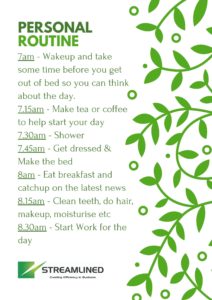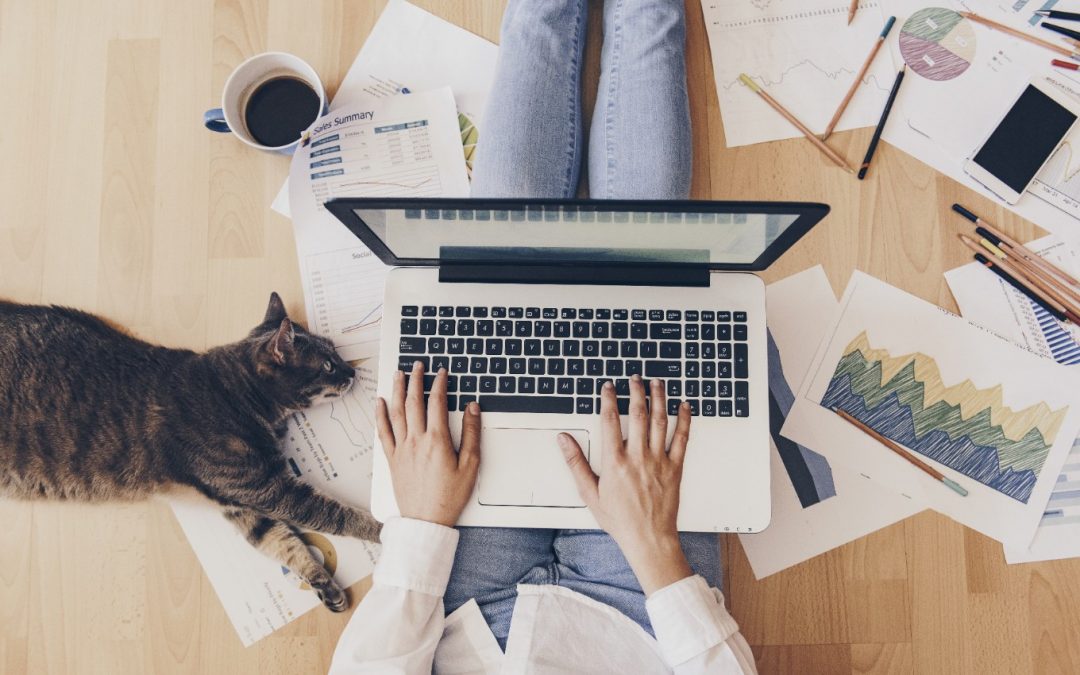Wow! Life sure is different today than a month or six weeks ago before Covid-19 Lockdown. There has been a lot of change in our normal day to day lives. Have we stopped to think how it is affecting our day to day living? Are you stressed about the changes or are you sitting back watching it all and smiling?
Our routines have also changed over the last couple of months. We may have had our kids at home doing a version of online schooling and a change of work environment. This may have made us create a new routine. Or are you just flying blind and making it up each day?
We may feel a bit out of control but if we set a new routine we can relax. Having a routine is something we can rely on, something we can control, which is good for our mental health.
Why routines are so important
Humans are habitual beings. Without even realising it we have a routine each day. We follow it without thinking. Sometimes things will happen that will upset the balance and we must make changes. Some people find this hard while others just go with the flow.
Routines are important because they keep us focused on specific tasks each day. This will distract us from the changes around us and what is happening in the outside world. These tasks might be personal, or work related.
Routines…Personal first
Setting a personal routine each morning saves time and helps us to remember to do those important tasks. For example, cleaning your teeth, moisturising your skin, washing your hair, taking your medication. The only decisions you need to make in the morning is what you are going to wear (yes it is a good idea when working from home to get out of your pyjamas), what to make for lunch, and what to eat for breakfast.
By following a morning routine each day, we are actually saving time because we no longer must take the time to make as many decisions. You just do it! Sometimes it takes a few days or a week to get used to a new morning routine. You may have to make some adjustments. If you write it down, then tweak it and make it comfortable for yourself. Everyone is different so your routine might be very different to others you live with.
Now, obviously everyone has different things they need to do each morning, but it is all about what works for you and repeating mostly the same things every day. It feels safe to follow a routine when everything else is changing in the world around you.

Your morning routine might look like this.
Routines for your workday
There are always things you need to accomplish each day and each week at work. Even monthly and three-monthly tasks. If you have a routine, you will always get everything done on time every time. Tasks will not be forgotten. You may need to use calendar reminders or a To Do list to plan out your day so you can focus on getting everything done.
Are you a person who likes to procrastinate? Look at the things you do instead of the important tasks? What are your go to Procrastination joys? Maybe find some time in your weekend when you can do those things, that way you won’t get distracted by them during your busy work schedule? There is no use avoiding the fact that you are a procrastinator. Maybe ask yourself why? It might be over lunch or while you are making coffee. Look at your personality. Know yourself and design a routine that works for you. Help yourself by learning about tools to help you focus.
Ticking off the tasks on your to do list is deeply satisfying. You will feel more confident and happier when you have completed these tasks. It spurs you on to get more done in the time allocated. Don’t forget to celebrate these small wins.
Routines can also be about control. If we are in control of this part of our lives, we will feel less stressed and less anxious. You can relax and enjoy your work more.
When we are in a routine and working for our clients, we will know exactly how much time we have spent on each task and what to charge. The more we do repetitive tasks for our clients the more efficient we will be. Our value goes up as we get more done.
Look at the time you start and end your workday. Are you more productive earlier in the day, say at 7am? If yes, you should be ticking off all the harder things on your to do list then or are you better at 2pm in the afternoon? Look at when your brain is most efficient for when you do certain tasks. At 3pm in the afternoon I am much better at doing the mundane tasks as they are the easiest and less time consuming. Again, everyone and every personality is different.
Overall, I try to set some small goals for my day…I try to do each of the following:

An example of some goals to have each day.
Expert Commentary by Marcus Whelan, Psychologist…
“Routines are habitual behaviours that become ‘routine’ and which we do without even thinking twice. Establishing routines and the benefits for this are about predictability, productivity, accountability and stability.
When we do things routinely without as much conscious will our minds are freed up for creativity and we are more adaptable in the face of stress and adversity. We’re actually able to keep better track of our day, our tasks.”
Routines are more predictable than life
While life is ever changing now, we really don’t know what is coming next. If we have a routine, we can rely on it, and it is predictable. Knowing what time, we start each day and when we finish, what time we usually stop for coffee and lunch, what weekly meetings we might have will help us in our routine and keep us on track and focussed.
What does your routine look like? Have you written it down? Do you use a To Do list or planning app like Trello or Asana? If you use a diary app on your phone it is easy to add things to remind you to keep to your routine…Instead of a blaring alarm reminding you it is time for a coffee break or lunch have a nice song play. By setting electronic reminders to take your breaks you will not get out of routine, things will stay calm and there will be no more of those late afternoon lunches!
Healthy routines
Drinking water is also something that needs to be included in your routine. Keeping hydrated and eating healthily is going to set you up for a more productive day. Your brain is less foggy when you drink enough water. Start with two litres a day. You will soon become addicted and start replacing those endless coffees with hydrating H2O. Try having a Berocca or Energy Fizz Stick instead of your next coffee.
Make sure you move in your daily routine. By doing some exercise or stretches it will make your brain think more clearly. Include 20 to 30 minutes of exercise in your routine each day.
Sleep routines
Part of a regular routine is getting enough sleep. Sleep is very important for our mental health. Going to be bed at a regular time each night will help our sleep routine and help us generally get through each day more effectively.
Our bodies need a regular bedtime to aid our sleep-wake cycle. This means by following a routine our bodies get used to the idea of sleep at a certain time and you will sleep better, stay asleep and be well rested in the morning. Your body will then be used to waking up at a similar time each day and start your day ready and raring to go.
Some people will look at routines and think they are too rigid and too structured. The need for some flexibility is important too.
Routines are here to stay.
Something that you can count on. In this ever-changing world, you will know what is happening next because YOU have decided. It was YOUR decision to eat breakfast this morning at 7 am. And it is your decision to go to bed at 10 pm tonight. Make routines part of your day so that you can be more efficient and get more done and have a healthier and happier life.
About our expert:
Marcus Whelan is a Psychologist, Educator, and Coach. I met Marcus when I enrolled in his online Procrastination workshop just a few months ago. At the start of Covid-19 lockdown I recognised as the work was drying up I was procrastinating a lot in the things I still had to do. Working through that with Marcus help me to stay focussed and move on.
“Marcus Whelan is a passionate psychologist. Marcus is all about empowerment and helping people confront their challenges, grow and be more connected to self and others.”
Please connect with Marcus: https://www.facebook.com/marcuswhelanpsychology/


Recent Comments